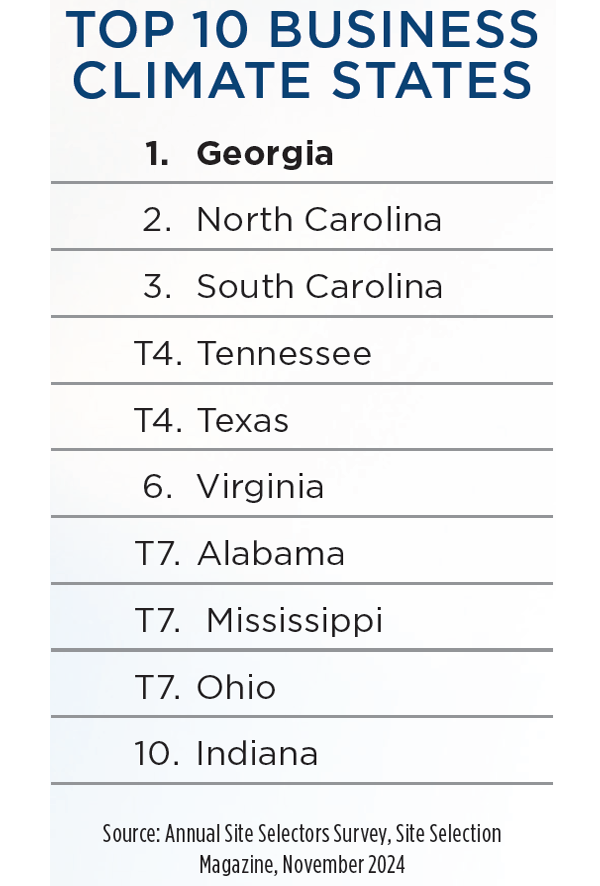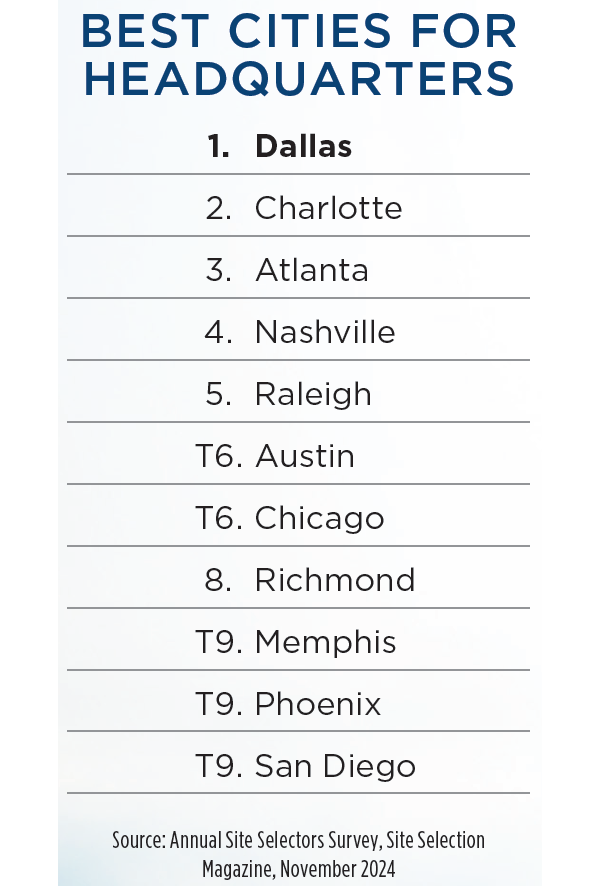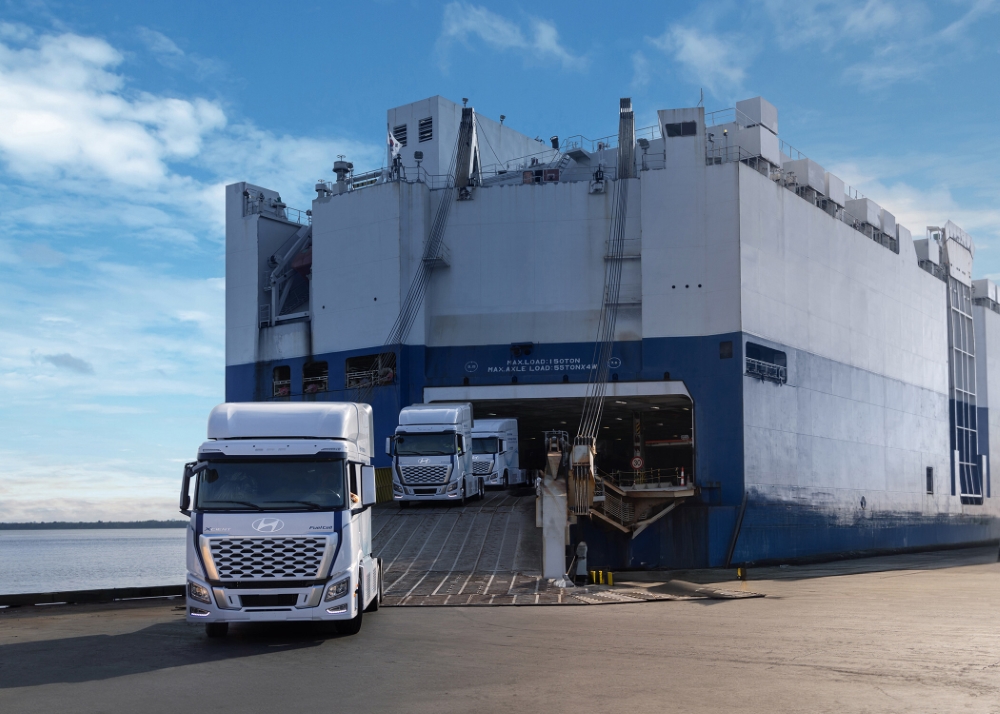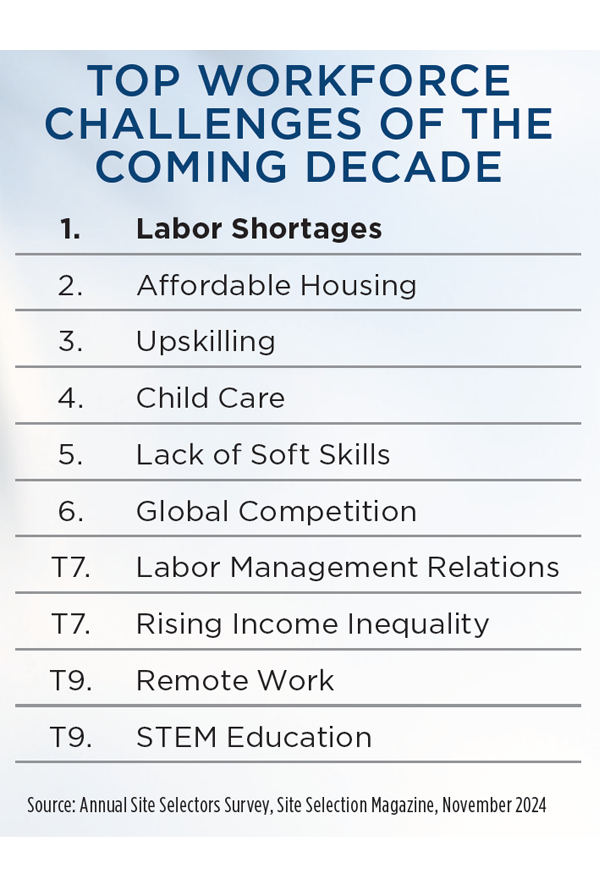
“Georgia On My Mind” may be the official state song of the Peach State, but it might as well be the anthem of site selection consultants.
In our annual Site Selectors Survey, the Peach State wracked up the most votes to dethrone last year’s winner, Texas, for Best Business Climate in the nation. North Carolina finished just behind Georgia in the runner-up spot, followed by South Carolina in third and then Tennessee and Texas in a tie for fourth. The rest of the top 10, in order, are Virginia in sixth place; Alabama, Mississippi and Ohio tied for seventh; and Indiana in 10th.
If you want to know what influences the thinking of site selectors and why they tend to favor Southern states, it pays to know the location factors that they value the most. We asked site selectors this question: “In your opinion, what are the three most important elements of a state business climate?” They responded that workforce, state and local tax policy, and cost of living are paramount. Ranking just behind these factors are incentives, quality of life and worker training programs.
A total of 36 site selectors participated in this year’s survey. Our annual questionnaire asked them to share their views on everything from their favorite business climates to how they value access to innovation hubs and the importance of power availability.
Other Key Findings:
- When asked to name the state that they feel has the worst business climate, nearly half (15) said California. Next highest on the list was New Jersey with four votes.
- South Carolina garnered the most votes for the state they believe has the best manufacturing workforce in America. Ohio and Michigan tied for second.
- When asked, “If you were running a company and needed to find a new home for the corporate headquarters, list three cities you would place on your short list,” Dallas received the most support, followed by Charlotte, Atlanta, Nashville and Raleigh. Austin, Chicago, Richmond, Memphis, Phoenix and San Diego were next.
- Mexico received the most support for best country ripe for new investment right now, beating out the U.S. by one vote. Last year, the U.S. finished first, just ahead of its southern neighbor.
- When asked to name the biggest workforce challenges of the coming decade, site selectors said labor shortages are No. 1, followed by affordable housing, upskilling, childcare and lack of soft skills.
- Access to an innovation or technology hub is either somewhat important or extremely important to 78% of respondents.
- A state’s commitment to sustainability principles is either somewhat important or extremely important to 64% of respondents.


Finally, we asked consultants an open-ended question about the importance of electric power as a site factor. Their answers were enlightening. Here is a sampling:
- “It is THE driving factor.”
- “Reliability, capacity and cost are all critical factors.”
- “If you don’t have available power, you are going to get cut.”
- “Capacity and infrastructure challenges limit site options.”
- “It has exerted greater influence. We now examine grid congestion much earlier in the process.”
- “Power supply and the related physical equipment are a constraint for projects of all sizes. The megawatts are at a premium, but so too are simple things like transformers.”
- “The demand for sufficient power will be a differentiating factor among states and communities for those projects (like data centers, battery factories and clean energy plants) that require large amounts of power.”

Hyundai XCIENT fuel cell trucks were photographed at the Port of Brunswick, Georgia, in September 2024.
Photo courtesy of Hyundai Motor Group Metaplant America

The South has a logistics and infrastructure advantage that has always made them attractive for projects like those that GLS work. Coupled with a relatively low-cost environment and relatively favorable business policies, they continue to be top of mind for many of our clients. From my perspective, key differentiators include economic development infrastructure and inventory availability. States like Tennessee and Georgia stand out for their state, utility and regional economic development organizations, which foster a collaborative partnership with location advisory firms. This collaboration can lessen some of the challenges of site selection, creating an environment of problem-solving and support rather than obstacles.”
— Tess Fay, Principal and Vice President of Location Intelligence, Global Location Strategies, Greenville, South Carolina

Experts: Here’s Why the South Wins
For additional perspective on our findings, we turned to notable experts in the field of site selection. John Boyd Jr., principal of The Boyd Company Inc., a national site consulting firm with offices in Florida and New Jersey, said he was not surprised that five southern states emerged on top of the list of best business climates.
“The findings of our fellow site selectors are very much in sync with our firm’s positive view of the business climate of these five southern states,” Boyd wrote in an email. “I did a survey of our files, both within Boyd Co. and our BizCosts.com unit, to see where our firm has been most active over the past three years. The five states cited in this year’s annual Site Selectors Survey accounted for roughly 60% of all our state-specific client inquiries and related location research.”
Boyd said the South wins the business climate race because of things like the demographic shift to the South, investments into site readiness, workforce training programs, the availability of incentives, lower costs and lower taxes, sound tax and fiscal policies, and positive labor-management relations. He added one other: “Having seasoned economic development professionals at the state and local levels and at major utility companies doing a superior job servicing consultant inquiries and promoting these states.”
Jay Garner, president of Garner Economics LLC in Atlanta, said, “The legislative branches in those states have worked tirelessly for years to be business friendly. Many rank favorably in the Tax Foundation’s annual tax competitiveness index.”
When asked why he thought California was named the worst business climate, Garner said, “California has the 48th worst tax competitiveness ranking according to the Tax Foundation, with only New York and New Jersey worse. Chief Executive magazine, which surveys CEOs annually, has California ranked as the worst business climate in the nation — dead last.”
Garner cited factors such as high taxes, burdensome regulations, high labor costs and lack of affordable housing as contributors to the state’s poor showing among CEOs in these surveys.
On the finding that South Carolina has the nation’s Best Manufacturing Workforce, Boyd said that this “has much to do with its top-notch workforce training program — readySC — that works hand-in-glove with the state’s network of technical colleges, as well as its outstanding labor-management relations climate.”
